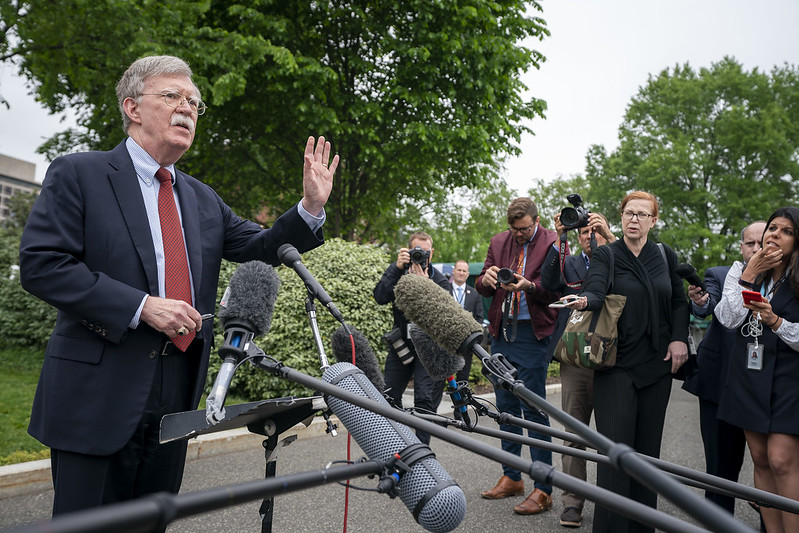
White House National Security Advisor Ambassador John Bolton talks to reporters Wednesday, May 1, 2019, outside the West Wing entrance of the White House. (Official White House Photo by Tia Dufour)
At CaitlinJohnstone.com, Caitlin Johnstone hammers all the neocons who participated in deceiving Americans into the Iraq war, and who are now, after twenty years, attempting to portray the adventure as anything but a failure. Her primary target is John Bolton, who argues in his defense of the Iraq war that it would have worked if only the U.S. had kept going and attacked Iran as well. Johnstone writes:
But by far the most appalling piece of revisionist war crime apologia that’s come out during the 20th anniversary of the invasion has been an article published in National Review by the genocide walrus himself, John Bolton.
Lumping everything together as “Iraq War” critics do is a disservice to the careful analysis of what America accomplished, or didn’t. It is not one indivisible, 20-year-long block of granite that can be judged only all or nothing. In fact, the brunt of https://t.co/2lhQ3EnqWW…
— John Bolton (@AmbJohnBolton) March 17, 2023
Bolton sets himself apart from his fellow Iraq war architects by arguing that the actual invasion and overthrow of Saddam Hussein “was close to flawless,” and that the only thing the US did wrong was fail to kill more people and topple the government of Iran.
Bolton criticizes “the Bush administration’s failure to take advantage of its substantial presence in Iraq and Afghanistan to seek regime change in between, in Iran,” writing that “we had a clear opportunity to empower Iran’s opposition to depose the ayatollahs.”
“Unfortunately, however, as was the case after expelling Saddam from Kuwait in 1991, the United States stopped too soon,” Bolton writes.
Bolton claims that the notoriously cruel sanctions that were inflicted upon Iraq between 1991 and 2003 were too lenient, saying there should have been “crushing sanctions” that were “enforced cold-bloodedly”.
As Reason’s Eric Boehm notes in his own critique of Bolton’s essay, perhaps the most galling part is where Bolton dismisses any responsibility the US might have for the consequences and fallout from the Iraq invasion, attempting to compartmentalize the “flawless” initial invasion away from all the destabilization and human suffering which followed by saying “they did not inevitably, inexorably, deterministically, and unalterably flow from the decision to invade and overthrow.”
“Whatever Bush’s batting average in post-Saddam decisions (not perfect, but respectable, in my view), it is separable, conceptually and functionally, from the invasion decision. The subsequent history, for good or ill, cannot detract from the logic, fundamental necessity, and success of overthrowing Saddam,” Bolton writes.
This is self-evidently absurd. A Bush administration warmonger arguing that you can’t logically connect the invasion to its aftereffects is like an arsonist saying you can’t logically connect his lighting a fire in the living room to the incineration of the entire house. He’s just trying to wave off any accountability for that war and his role in it.
“One might suspect that Bolton imagines a world where actions should not have consequences because he’s been living in exactly that type of world for the past two decades,” Boehm writes. “Somehow, he’s retained his Washington status as a foreign policy expert, media commentator, and presidential advisor despite having been so horrifically wrong about Iraq.”
If you’re willing to fight for Main Street America, click here to sign up for the Richardcyoung.com free weekly email.





